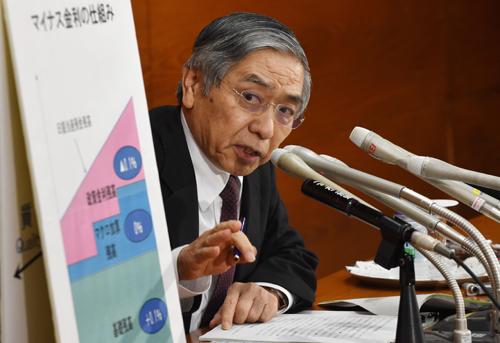You are here
New rules, low rates push European companies into risky investments
By Reuters - Nov 27,2014 - Last updated at Nov 27,2014
LONDON — European firms squeezed by low interest rates are having to consider new, riskier ways to manage trillions in corporate cash as they are snubbed by banks awash in new regulation that may also spell the demise of their go-to investment funds.
In order to protect and grow their companies' money and ensure it is easily accessible to pay wages, invoices and dividends, treasurers are being forced to look at less secure assets and deal with some of them directly.
"There is a tectonic shift in the cash management landscape," said Alastair Sewell, a managing director at Fitch rating agency. "One option is to take on more risk."
Corporate treasurers have been under pressure since the financial crisis of 2007-09 when the collapse of banks such as Britain's Northern Rock and Lehman Brothers in the United States — and the ensuing panicked withdrawals from money market funds — rattled confidence about where to stash firms' cash.
Determined not to be caught short in the next crisis should banks cut off their funding, company treasurers in the United States, Britain and the eurozone have more than doubled their cash holdings since 2000 to $5.3 trillion.
But now firms find the banks don't want their money.
A side-effect of new financial regulation aimed at making banks safer by forcing them to hold more capital and low-risk assets means lenders now have to classify some large corporate depositors, traditionally more flighty than small retail customers, as high risk.
That also means banks can only invest those corporate funds in very liquid assets that restrict them from making much in the way of commission.
"They won't say no to you, they will just quote you the worst rate they can," said one London-based treasurer.
Some major banks like Commerzbank and BNY Mellon are also charging some of their customers for euro deposits, passing on the cost of a decision by the European Central Bank (ECB) in June to charge banks for overnight deposits, a rule introduced to force banks to go out and lend.
It's another consequence of the record low interest rates that make it difficult for companies to make any return from deposits.
No more money markets?
Money market funds, which provide a deposit-like facility, would normally pick up the slack from the banks but plans to regulate that sector too could ruin its appeal for treasurers.
Europe wants to impose curbs on money market funds that offer investors a fixed price, accounting for around half the 1-trillion-euro industry in the region, because regulators believe they are more prone to investor runs.
Under proposals being considered by the European Parliament, corporate treasurers will no longer be able to buy into so-called constant net asset value (CNAV) funds unless the fund invests most of its assets in lower-yielding government bonds.
If the CNAV proposals are accepted, treasurers could switch to money market funds that offer variable returns but that would require them to track numerous tiny gains and losses and pay tax on any surplus.
Alternatively they may be forced to go back to the banks, negotiating terms for their cash deposits with lenders that have sufficiently strong credit ratings to be able to take them on.
"If the CNAVs are abolished then what we will see is greater concentration of cash with national champion banks and that is not a good thing for systemic risk or for practical operation of liquidity management for companies," said Richard Raeburn, chairman of the European Association of Corporate Treasurers.
From depo to repo to...
Already major companies are getting inventive with their cash. Rather than haggling over deposits, many are striking repurchase agreements — also known as repos — with banks.
From a trickle that started during the financial crisis, there is now a flood of companies switching from "depo to repo" and lending banks short-term money in return for collateral: International clearing house Clearstream has seen a 200 per cent increase in demand for this service this year.
For a large company which already manages foreign exchange exposures and short-term investments, setting up a repo desk could just mean an extra computer screen but for a smaller firm used to simply handing over cash to a bank or money market fund it would be a major investment and change of strategy.
"Some corporate treasurers are going into repos that's great for large companies, a serious alternative. But what about small- and medium-sized enterprises and charities who don't have the necessary technical ability?" said Raeburn.
Other treasurers are depositing money with banks in Asia and the Middle East and are considering investing their excess cash in higher yielding, and riskier, assets such as company bonds.
"We have been... actively considering alternative asset classes," said Stephen Percival, group financial controller and treasurer at British insurer Standard Life. "We now deal with a far broader geographical range of banks."
Anticipating more money on the move, particularly if CNAVs are restricted, some asset managers are creating new products for investors, including funds that are not rated by the rating agencies and funds that invest in riskier assets to ensure a higher rate of return.
"Money funds are the safe harbour," said Tony Carfang, partner at consultancy Treasury Strategies. "If that goes away you are cutting a lot of treasurers loose, a lot of money loose."
Related Articles
FRANKFURT — European Central Bank (ECB) chief Mario Draghi unleashed a bold easing package on Thursday, cutting rates and expanding asset bu
AMMAN — Al-Mehanya for Real Estate Investments and Housing Co.
TOKYO — The Bank of Japan (BoJ) unexpectedly cut a benchmark interest rate below zero on Friday, stunning investors with another bold move t













